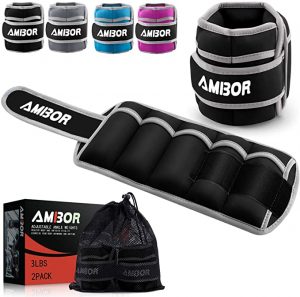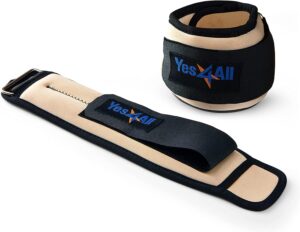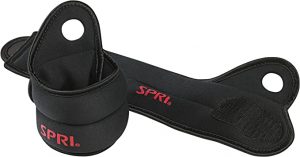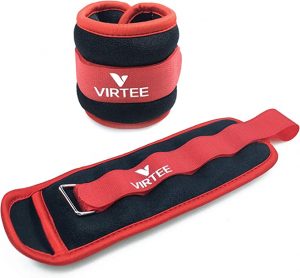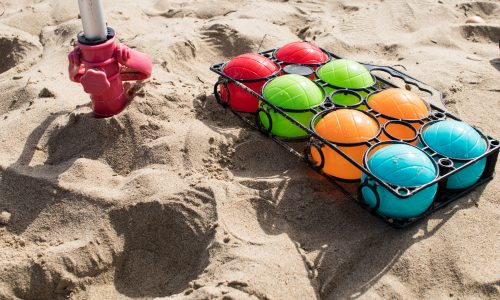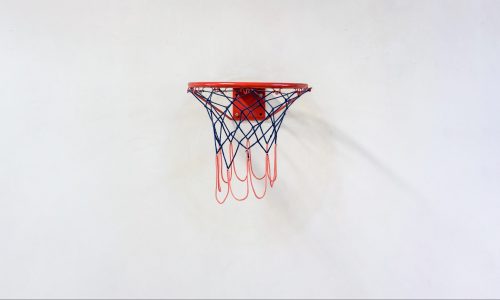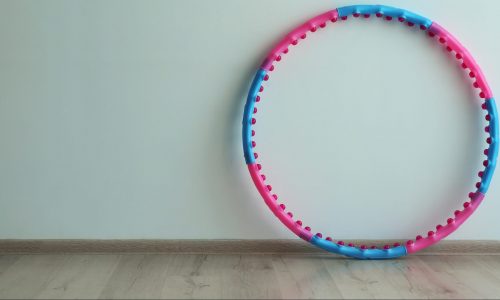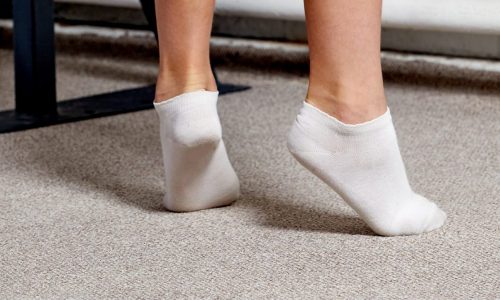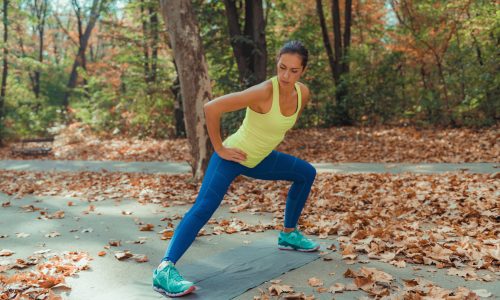The Best Wrist Weights
We looked at the top 13 Wrist Weights and dug through the reviews from 35 of the most popular review sites including and more. The result is a ranking of the best Wrist Weights.

Our Review Process
Don't Waste Your Money is focused on helping you make the best purchasing decision. Our team of experts spends hundreds of hours analyzing, testing, and researching products so you don't have to. Learn more.
Our Picks For The Top Wrist Weights
- 1. Fragraim Snug-Fit Cotton Wrist Weights
- 2. AMBOR Extended Length Breathable Wrist Weights
- 3. Sportneer Neoprene Non-Slip Wrist Weights
- 4. SPRI Thumblock Secure Fit Wrist Weights
- 5. Yes4All Interlocking Cardio Wrist Weights
- 6. REEHUT Durable Wrist Weights
- 7. Champion Sports One-Size Velcro Close Wrist Weights
- 8. Henkelion Adjustable-Weight Strap Wrist Weights
- 9. GYMENIST Slide-On Jogging Wrist Weights
- 10. Virtee Strength Training Ankle & Wrist Weights
- 11. TOSAMC Wearable-Bracelet Wrist Weights
- 12. BalanceFrom GoFit Adjustable Wrist Weights
- 13. Bala Bangles Wearable Adjustable Wrist Weights
Soft, mercerized cotton makes these wrist weights comfortable while also providing welcome moisture absorption. You’ll get five sandbags in each band, so you can modify the weight between a 1 and 3 pound range. The adjustable strap allows you to wear these weights on your wrists, ankles, arms or legs.
Customizable OptionEach wrist weight has five sandbags that allow you to adjust the weight from 1 to 3 pounds as needed.
Start small and work your way up with these ankle and wrist weights, which can be adjusted with five removable iron beads. A Velcro band lets you find the perfect fit, whether you’re wearing them on your wrists or ankles. They're soft and flexible, made of neoprene for breathability and comfort.
Perfect for BeginnersIf you’re just starting out with weight training, you'll want this set of adjustable wrist weights.
If you're searching for a customizable set of wrist weights, this pick is an excellent choice. Each of the weights features five built-in sand pockets, allowing you to start off with just one insert and then work your way up to all five inserts. The length is also adjustable, so you can easily use the weights on your ankles as well.
Multiple Color OptionsYou'll find this set of wrist weights is available in a choice of black, blue, orange, pink or purple.
Although these wrist weights are just 1 pound, you can get them in weights of up to 5 pounds. That makes them perfect for beginners who want to work their way up to the heavier weights. Each set includes two weights, which are made using a soft and durable neoprene material.
Affordable PickWhen sticking to a budget, you'll find these wrist weights have an economical price tag.
Buying Guide
Finding time to work out can be tough. This is especially true if you prefer to go for a walk, jog or run versus lifting weights in the gym. But those types of aerobic exercises won’t give your arms the strengthening exercises they need.
Walking with hand weights increases the resistance of your aerobic workout, making it more strenuous without lengthening its duration or difficulty. But using these weights means you won’t have your hands free. As you sweat, your palms will also get slippery, making it tough to maintain your grip. That’s why many people choose wrist weights (which can also be worn around your ankles!) instead.
Wrist weights help tone and strengthen your upper body. Some studies have also found that the extra weight increases your exertion, helping you burn more calories during your cardio sessions.
Typically, wrist weights attach to the wrist using hook-and-loop straps (like Velcro). They’re often sized as “one size fits all,” so the adjustability provided by the fastener allows you to find that perfect fit. You’ll also be able to choose from a range of weights. Some products even let you remove weights and gradually add them back in as your endurance improves.
When using wright weights, it’s important to monitor your heart rate to make sure you’re not exceeding the recommended levels. The extra weight can also dial up your blood pressure a little, so if you have blood pressure issues, that’s also something to consider.
When you’re starting with wrist weights, it’s best to ease your way in. If possible, start by wearing them at the start or end of your aerobics session, then add minutes on as you grow more comfortable with them. You could also adjust the weight to a lower level and gradually build your strength.
Why we recommend these wrist weights?
Products Considered
Products Analyzed
Expert Reviews Included
User Opinions Analyzed
Our experts reviewed the top 13 Wrist Weights and also dug through the reviews from 35 of the most popular review sites including and more. The result is a ranking of the best of the best Wrist Weights.
DWYM is your trusted roduct review source. Our team reviews thousands of product reviews from the trusted top experts and combines them into one easy-to-understand score. Learn more.
The Best Bang For Your Buck
Yes4All Interlocking Cardio Wrist Weights
Key Takeawy
Although these wrist weights are just 1 pound, you can get them in weights of up to 5 pounds. That makes them perfect for beginners who want to work their way up to the heavier weights. Each set includes two weights, which are made using a soft and durable neoprene material.
What to Look For
- Before you add wrist weights to your daily workout routine, it’s important to talk to your doctor about it, particularly if you have underlying health conditions. Your medical professional may recommend you keep your toning sessions separate from your aerobic workouts.
- The American Council on Exercise cautions against using wrist weights while running. They’re best used for walking, aerobics and step aerobics.
- Your wrist weights should weigh 1-3 pounds total for maximum benefits in increasing oxygen intake and heart rate. Any more weight puts too much stress on your joints and muscles.
- It’s important to look at the material used to make your wrist weights. Cotton is lightweight and breathable, but can have issues with soaking up moisture. Many wrist weights use mercerized cotton, which simply means the yarn has been treated to increase its luster. This can also improve its moisture-wicking properties to help keep you dry. Neoprene is another popular material for wrist weights due to its superior moisture-wicking properties and breathability.
- If you choose a set of wrist weights with adjustable weights, look at the weight range of each. Some allow you to move between a wider range of weights than others. Also consider where you’ll store the extra weights when you aren’t using them.
- Many wrist weights are adjustable enough that you can wear them around ankles as well. Some can even be worn around your legs or arms. If you want this versatility, shop for a pair of wrist weights that offers it.
- Wrist weights don’t have to look like workout gear. You can find select options that keep you looking stylish while you’re working out. You may even be able to get away with wearing them to work or while you’re running errands.
- Color options can be limited with wrist weights. Often they come in black, but you can find some with multiple color options that let you show off your personal style.
- Look at the way a pair of wrist weights attaches. They generally use hook-and-loop straps, but you’ll want to make sure the Velcro-style surface is extra-strong to reduce the risk they’ll detach while you’re wearing them.
- The one-size-fits-all nature of wrist weights can make it tough to find the right fit. You won’t want them to slip around during wear. Look for a pair that provides a snug fit whether you’re walking or doing an intense cardio session.
More to Explore
Starting in your mid-30s, your muscle mass starts to decline, making it all that much harder to tone and strengthen. Every decade after the age of 30, you lose between 3-8% of your muscle mass, and once you reach the age of 60, that loss accelerates.
As you get older, this muscle mass loss can become a problem. In fact, it’s a leading contributor to disability in older adults. The muscles serve as important protection for your bones, so with age, you’ll find even a simple fall can cause more damage than it would have just a few years earlier. With muscle mass loss also comes an increase in fat mass, which can cause other health problems, including an increased risk of insulin resistance.
Sarcopenia, or muscle loss due to aging, affects about 10% of people 50 and older. You can decrease its effects by eating a balanced diet, staying active and reducing stress levels as much as possible.



